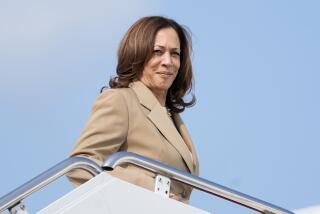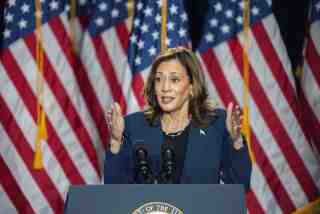Forbes Finds Political Fame Is as Swiftly Lost as Gained
- Share via
NEW LONDON, N.H. — Less than one month ago, Steve Forbes was on the covers of Time and Newsweek. Now he’s on the brink of falling by the wayside in the Republican presidential race.
In the years to come, Forbes may be remembered as the political equivalent of Kato Kaelin: a man who exploded into celebrity, then rapidly began to fade. Leading in the polls here as recently as the beginning of this month, the millionaire publisher has fallen to fourth in nearly all the leading surveys.
As he toured this scenic small town late last week, his aides held out hope that Forbes has hit bottom and started the long climb back into contention. But the other campaigns now universally believe that Forbes has been mortally wounded. In politics the only thing worse than being attacked is being ignored, and in Thursday night’s debate the leading candidates maneuvered around Forbes as if he were so much road kill.
“He has dug a very deep hole for himself,” says Whit Ayres, the pollster for former Tennessee Gov. Lamar Alexander. “It would be very difficult for him to climb out.”
Still potentially within reach of third place, but fading in surveys, Forbes puts his hope for revival on a reaffirmation of the outsider themes that launched him. In his speeches, Forbes strikes a Jeffersonian pose, declaring that the common theme in his ideas is to “return control from the government back to the people.”
He denounces the protectionism and isolationism of the suddenly high-flying Patrick J. Buchanan as a recipe for global depression and international conflict.
And like former Housing and Urban Development Secretary Jack Kemp, the man he hoped would carry the banner of supply-side economics into the campaign, Forbes touts the gospel of growth, insisting that the Republican Congress went off track when it devoted too much effort to cutting spending and not enough to invigorating the economy. Forbes can measure his influence in the increased frequency with which his rivals now talk about the need to accelerate economic growth.
But Forbes may have to content himself with having influenced the race. His rapid rise and fall show how the compression of the primary calendar and the acceleration of the judgment cycle in the media now magnifies political trends--and can send the candidates careening even before any actual voters render their verdicts. “It’s like the way Christmas now starts the day after Thanksgiving,” says Bill Dal Col, Forbes’ campaign manager. “Now, not only have we condensed the primary process, we have accelerated the coverage process so that it takes place before the caucuses.”
When Forbes announced his candidacy last fall, the press and his rivals initially treated the first-time candidate as a sideshow.
But with an unrelenting advertising barrage, Forbes steadily climbed in the polls in Iowa and New Hampshire. By the time the candidates met in Des Moines for a debate on Jan. 13, Forbes was enough of a threat that several ganged up to denounce his proposal for a 17% flat tax on income. Many political analysts believe the unified assault initially backfired by confirming Forbes’ portrayal of himself as the true outsider in the field.
Time and Newsweek followed by putting him on their covers two weeks later, and Forbes rocketed in the polls--especially here, where he surged past Sen. Bob Dole of Kansas into first place, largely on the strength of younger, independent voters hostile to politics as usual.
But the cycle turned again with breathtaking speed. In ads and on the stump, Dole and the other candidates pounded the flat tax as likely to raise middle-class taxes and lower housing values; they portrayed Forbes as inexperienced, untested and a closet liberal on such issues as welfare and abortion.
Forbes compounded his problems by picking a fight with the influential Christian Coalition just before the Iowa caucuses. And the swarm of negative ads he released against his rivals turned back to sting him for “mudslinging.”
“Forbes became just another politician by engaging in that negative campaign, and once he did he just crumbled,” says Gerry Chervinsky, whose KRC Communications Research conducts polls in New Hampshire for the Boston Globe.
When Forbes sagged to fourth in Iowa, his support eroded here virtually overnight. “I think he had a glass jaw,” says Ayres. “And that got broken in Iowa.”
Polls leave little doubt that his opponents’ assaults and his own missteps have left deep scars on Forbes; Chervinsky’s polling shows a plurality of Republican primary voters here have a negative opinion of him. But on the stump, Forbes’ blend of tax cuts, political reform and techno-optimism still has appeal.
Ted Short, a consultant from Grantham, N.H., arrived at Forbes’ town meeting here last week intending to vote for Alexander. He left willing to reconsider Forbes. “He did very well; very impressive,” Short said.
Forbes’ ability to fund his own advertising would allow him to continue after a showing here that might financially asphyxiate other campaigns. He has already invested heavily in Delaware, whose primary is Saturday, and Arizona, which votes Feb. 27, though Dole aides say their polling shows Forbes has fallen from the first-place position he held in Arizona for weeks.
Forbes pointedly refuses to say he will leave the race if he fails to meet his own goal of finishing third here. Dal Col reduces their ambition to merely running close enough to the pack to reestablish upward momentum. But if Forbes finishes far behind in a state whose demographic makeup and tax-o-phobic politics make it ideal ground for him, even those around the candidate acknowledge they must seriously consider whether to go on.
“You look at every campaign and there’s a cycle--there are peaks and valleys,” says Dal Col. “The test is whether you have the strength to come out of the valleys.”
More to Read
Get the L.A. Times Politics newsletter
Deeply reported insights into legislation, politics and policy from Sacramento, Washington and beyond. In your inbox twice per week.
You may occasionally receive promotional content from the Los Angeles Times.










